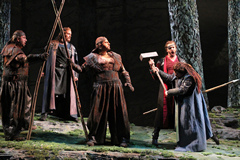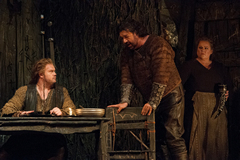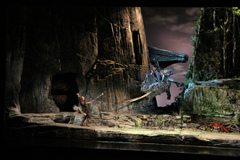| Opera Reviews | 3 May 2024 |
Seattle Opera's Ring continues to command attentionby Neil Jenkins |
|
| Wagner: Der Ring des Nibelungen Seattle Opera 12 to 17 August 2013 |
|
|
A cheering standing ovation from the audience at the close of each opera left me in no doubt of why Seattle Opera are so proud of their Ring. For the opening of Das Rheingold Jennifer Zetlan, Cecelia Hall and Renée Tatum moved gracefully as Rhinemaidens, not unlike mermaids, as they were flown around the stage narrowly escaping Alberich's clutches. Richard Paul Fink as Alberich showed his true nature throughout - a character we love to hate especially in Götterdämmerung where his persuasive manner highlights the dream sequence with Hagen. Once in the forest Fricka reminds her husband that the giants will soon claim their reward for building their home. Stephanie Blythe commanded the stage with her presence throughout the cycle, whether it be Fricka, Second Norn or Waltraute. Her voice has warmth and strength and yet she can be passionate, an attribute that must be the envy of the very best of mezzo sopranos. Here, the role of Fricka seemed stronger than I have experienced in previous productions so it was no surprise that director Stephen Wadsworth had her witnessing the death of Siegmund, almost as if she trusts no one, not even her husband, to uphold her wishes. Wotan was dramatically played by Greer Grimsley. His stature alone gave him a compelling presence at all times, regardless of what else was happening. His tenderness for Wotan's farewell compared to his loud stern call for Loge to place a fire around Brünnhilde's rock was impressive. Mark Schowalter, a newcomer for Seattle, was breathtaking as Loge and together with Grimsley, and Dennis Petersen as Mime, we see much adroitness in the Nibelheim scene. Giants Andrea Silverstrelli as Fasolt (later as Hunding) and Daniel Sumegi as Fafner (later Hagen) asserted supremacy. The giants, as with the dwarfs, were evenly matched both physically and vocally. Sumegi's rendition as Hagen was of unveiling importance. Wendy Bryn Harmer, (as with Blythe) delivered the same roles she had previously undertaken with The Metropolitan Opera. Her Freia and Gutrune were delivered with a strong full-bodied, warm, lyric sound. |
|
|
Alwyn Mellor sang Brünnhilde. She was vocally strong, with vibrato in the upper register, and at times too soft with her lower notes, but this is a huge role and I believe she had suffered a virus the previous week. Her acting, second to none, was delivered with total conviction especially during the final scene in Götterdämmerung. The Ride of the Valkyries was to be another high spot of the evening and I should comment here, that the occasional humour shown in the English surtitles, was not missed eg. one of the Valkyries when questioned where she was replied 'I was busy!' Some of Siegfried's remarks when attempting to communicate with the Forest Bird were very apt. Perhaps the most unexpected surprise for me, right from his first entry
in Siegfried, was the excellence of tenor Stefan Vinke. What strength
and energy he gave. The lengthy scene with Mime seemed to go more quickly
than I have experience previously. Vinke's clarity of sound together with
his excellent diction and his beauty of tone impressed me from the first
note to the last. It was nowhere better than in the scene shortly before
Siegfried's death when he recalls his first meeting with Brünnhilde. |
|
|
There were plenty of special effects in this Ring - the fire to surround Brünnhilde (though not the finest I have seen); a huge bear appearing behind Siegfried as he returns from the forest; a magnificent and definitely the finest dragon we are ever likely to see, complete with a mighty wing span; and a live horse being led onstage ahead of Siegfried's 'Rhine Journey'; to name a few. Conductor Asher Fisch was in complete control of each evening together with members from the Seattle Symphony Orchestra. There were no surprises with tempi. I must comment on the noteworthy sounds from the woodwind and brass. Following the Götterdammerung curtain calls the company's retiring director Speight Jenkins acknowledged the many people who gave their unlimited support to the success of this production and he indicated that there will be further performances of this Ring. |
|
| Test:
© Neil Jenkins Photos: © Alan Alabastro / Elise Bakketun |

 The
success of Seattle Opera's massive undertaking of Wagner's epic is largely
due to the outstanding design and clever staging together with a superb
cast of principal singers and chorus. The costuming is excellent and
the idea from set designer Thomas Lynch, in bringing the singers close
to the audience, is overwhelming. The depth of the stage may not equal
that of other large houses, but scenery changes are slick due to an
extremely wide wing space. The forest is a replica to that of a mountainous
area north of Seattle which has been created with the care and detail
needed to give it authenticity.
The
success of Seattle Opera's massive undertaking of Wagner's epic is largely
due to the outstanding design and clever staging together with a superb
cast of principal singers and chorus. The costuming is excellent and
the idea from set designer Thomas Lynch, in bringing the singers close
to the audience, is overwhelming. The depth of the stage may not equal
that of other large houses, but scenery changes are slick due to an
extremely wide wing space. The forest is a replica to that of a mountainous
area north of Seattle which has been created with the care and detail
needed to give it authenticity.  In
the opening of Die Walküre Stuart Skelton as Siegmund and Margaret
Jane Wray as Sieglinde, were the incestuous lovers. They were perfectly
matched vocally. Their singing was outstanding and Skelton's 'Winterstürme'
created an exciting highlight.
In
the opening of Die Walküre Stuart Skelton as Siegmund and Margaret
Jane Wray as Sieglinde, were the incestuous lovers. They were perfectly
matched vocally. Their singing was outstanding and Skelton's 'Winterstürme'
created an exciting highlight.  Götterdämmerung
also had its special moments. Blythe and Wray were joined by a warm and
pleasing tone from Lauretta Bybee in singing the three Norns. Baritone
Markus Brück sang an admirable Gunther and we had already heard him as
Donner. Lucille Beer as Erde appeared through a stone wall for her final
entrance. Her rich mellow tone was evident and she showed an exceptional
legato line.
Götterdämmerung
also had its special moments. Blythe and Wray were joined by a warm and
pleasing tone from Lauretta Bybee in singing the three Norns. Baritone
Markus Brück sang an admirable Gunther and we had already heard him as
Donner. Lucille Beer as Erde appeared through a stone wall for her final
entrance. Her rich mellow tone was evident and she showed an exceptional
legato line. 





